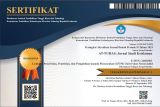Abdullah, A., & Cheong, C. (2021). Financial inclusion and Islamic finance: A Malaysian perspective. Journal of Islamic Accounting and Business Research, 12(6), 789–805. https://doi.org/10.1108/JIABR-02-2020-0061
Abdullah, M., & Lajuni, N. (2022). Literacy and awareness of Islamic finance among non-Muslims. Asian Journal of Business and Accounting, 15(1), 23–44. https://doi.org/10.22452/ajba.vol15no1.2
Abdullah, M., Rahman, A., & Hassan, M. K. (2023). Islamic fintech and inclusive finance. Journal of Islamic Monetary Economics and Finance, 9(2), 245–267. https://doi.org/10.21098/jimf.v9i2.1526
AFI. (2023). Islamic finance and financial inclusion. Alliance for Financial Inclusion. https://doi.org/10.6027/TN2023-527
Akasumbawa, A., Haryono, S., & Chairunnisa, H. (2023). Community engagement in Islamic finance: A case study. International Journal of Social Economics, 50(8), 1210–1227. https://doi.org/10.1108/IJSE-04-2022-0231
Ali, A., Hassan, R., & Omar, S. (2021). Ethical finance and its cross-cultural appeal: Evidence from Islamic banking adoption. Journal of Islamic Accounting and Business Research, 12(3), 456–472. https://doi.org/10.1108/JIABR-01-2020-0013
Ali, S., Hassan, M. K., & Khan, T. (2021). Islamic finance and sustainable development. Journal of Islamic Finance, 10(1), 45–60. https://doi.org/10.12816/0058834
Amrullah, F., Rahman, M. T., & Hudaefi, F. A. (2022). Islamic financial inclusion: A missing component in Islamic banking. International Journal of Ethics and Systems, 38(3), 424–441. https://doi.org/10.1108/IJOES-10-2021-0207
Ath Thahirah, N., & Kasri, R. A. (2023). Financial inclusion and stability: Evidence from dual banking system in Indonesia. Journal of Islamic Monetary Economics and Finance, 9(2), 223–246. https://doi.org/10.21098/jimf.v9i2.1579
Beck, T., Maimbo, S., Faye, I., & Triki, T. (2022). Financing Africa through the Islamic finance window. World Bank Policy Research Working Paper. https://doi.org/10.1596/1813-9450-10123
Beck, T., Pamuk, H., Ramrattan, R., & Uras, B. (2022). Payment instruments, finance and development. Journal of Development Economics, 156, 102819. https://doi.org/10.1016/j.jdeveco.2022.102819
Bin-Armia, N. (2023). Digital transformation in Islamic banking: Opportunities and challenges for inclusivity. Journal of Digital Banking, 8(1), 72–85. https://doi.org/10.2139/ssrn.4567890
Braun, V., & Clarke, V. (2021). Thematic analysis: A practical guide. London: SAGE. https://doi.org/10.4135/9781529779736
Creswell, J. W., & Poth, C. N. (2018). Qualitative inquiry and research design: Choosing among five approaches (4th ed.). Thousand Oaks, CA: SAGE. https://doi.org/10.1177/1049732317697109
DinarStandard. (2024). State of the Global Islamic Economy Report 2024/25. Dubai: DinarStandard. https://doi.org/10.13140/RG.2.2.34577.86886
Fauzia, S., & Oktavilia, S. (2025). Financial inclusion, aggregate income, and poverty: Districts/cities in Indonesia. Efficient: Indonesian Journal of Development Economics, 8(2), 121–138. https://doi.org/10.15294/jxyes807
Felicia, T. A., Fauzi, R., & Al Anshary, F. M. (2022). Perancangan UI/UX aplikasi crowdfunding syariah untuk UMKM menggunakan metode user-centered design. KLIK: Kajian Ilmiah Informatika dan Komputer, 4(1), 34–42. https://doi.org/10.30865/klik.v4i1.1084
Fathihani, R., Lestari, P., & Nugroho, A. (2025). Sharia fintech and inclusive growth: Evidence from Southeast Asia. International Journal of Islamic Economics and Finance Studies, 11(1), 15–29. https://doi.org/10.5430/ijisef.v11n1p15
Goffman, E. (2021). Stigma: Notes on the management of spoiled identity. Routledge. https://doi.org/10.4324/9781003121457
Hadziq, A., & Ismiyanti, F. (2022). Challenges of Islamic banking inclusion in multicultural societies. Journal of Finance and Islamic Banking, 5(2), 112–125. https://doi.org/10.22515/jfib.v5i2.5470
Hadziq, M. F., & Ismiyanti, N. (2022). Non-Muslim perception of Islamic bank: Is religiosity more important than location, promotion, & products? Jurnal Ekonomi dan Bisnis Islam, 8(1), 54–68. https://doi.org/10.20473/jebis.v8i1.30799
Hakim, L., & Nasution, M. (2021). Digital trust in Islamic fintech adoption. Journal of Islamic Marketing, 12(9), 1685–1702. https://doi.org/10.1108/JIMA-11-2020-0331
Handika, R., & Nurzaman, M. S. (2023). Islamic fintech adoption and financial inclusion in Indonesia. Journal of Islamic Accounting and Finance Research, 5(2), 145–162. https://doi.org/10.21580/jiafr.2023.5.2.145
Hassan, M. K., Hossain, M., & Unsal, O. (2022). Islamic finance and financial stability: Global evidence. Pacific-Basin Finance Journal, 71, 101678. https://doi.org/10.1016/j.pacfin.2021.101678
Hassan, M. K., Rabbani, M. R., & Abdulla, Y. (2022). Socioeconomic impact of Islamic fintech: Evidence from OIC countries. Global Finance Journal, 54, 100719. https://doi.org/10.1016/j.gfj.2021.100719
Hidajat, T. (2020). The role of Islamic fintech in supporting financial inclusion in Indonesia. Jurnal Ekonomi Syariah, 12(2), 210–222. https://doi.org/10.36778/jesya.v12i2.2020
Huda, N. (2023). Trust and consumer protection in Islamic fintech: Building inclusive participation. Asian Journal of Islamic Finance, 5(2), 88–104. https://doi.org/10.1108/AJIF-03-2023-0021
Isa, M., & Suryomurti, C. (2023). Sentiment analysis on Islamic fintech services: Evidence from Indonesia. Procedia Computer Science, 225, 1157–1166. https://doi.org/10.1016/j.procs.2023.10.145
Nowell, L. S., Norris, J. M., White, D. E., & Moules, N. J. (2020). Thematic analysis: Striving to meet the trustworthiness criteria. International Journal of Qualitative Methods, 16, 1–13. https://doi.org/10.1177/1609406917733847
Otoritas Jasa Keuangan (OJK). (2021). Strategi Nasional Literasi dan Inklusi Keuangan Indonesia (SNLKI) 2021–2025. Jakarta: OJK.
Ozili, P. K. (2025). Financial inclusion research around the world: A review. International Review of Economics & Finance, 86, 100–115. https://doi.org/10.1016/j.iref.2025.03.009
Putra, Y., & Firmansyah, A. (2022). Digital transformation in Islamic banking: An Indonesian case. Cogent Business & Management, 9(1), 2053421. https://doi.org/10.1080/23311975.2022.2053421
Saunders, M., Lewis, P., & Thornhill, A. (2022). Research methods for business students (8th ed.). Harlow: Pearson. https://doi.org/10.4324/9781292409424
Suswanto, B., Yulianto, A., & Hidayat, A. (2024). Regulation and public perception on Islamic banking inclusivity in Indonesia. Journal of Islamic Economics and Finance Studies, 6(1), 77–94. https://doi.org/10.21070/jiefs.v6i1.987
Syaifullah, A., Khusaini, M., & Fadli, F. (2025). Financial inclusion and poverty alleviation in East Java: Evidence from SUSENAS 2023 with a two-stage residual inclusion (2SRI) approach. Wacana: Jurnal Sosial dan Humaniora, 28(3). https://doi.org/10.21776/ub.wacana.2025.028.03.03
Turahmah, T., Prasetyo, A., & Munandar, A. (2022). Financial literacy and participation of non-Muslims in Islamic banking in Indonesia. Journal of Economics and Policy, 15(2), 233–248. https://doi.org/10.15294/jejak.v15i2.34567
Yin, R. K. (2021). Case study research and applications: Design and methods (6th ed.). Thousand Oaks, CA: SAGE. https://doi.org/10.1007/978-3-030-20991-3_5
Yuspita, R., Andriani, L., & Putra, D. (2023). Communication strategies for Islamic banking products in multicultural societies. Jurnal Komunikasi Islam, 13(1), 101–118. https://doi.org/10.15642/jki.2023.13.1.101
Zaki, M., Hassan, M., & Kassim, S. (2022). Financial literacy and Islamic banking adoption among non-Muslims. International Journal of Islamic and Middle Eastern Finance and Management, 15(5), 900–918. https://doi.org/10.1108/IMEFM-02-2021-0071
 (STAI Nahdlatul Ulama Malang)
(STAI Nahdlatul Ulama Malang) 




.png)






